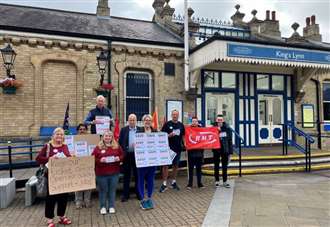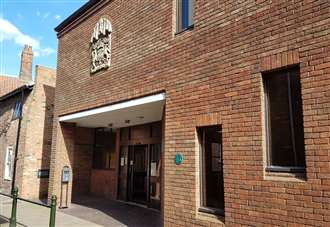
Campaigners have called for ticket offices to be saved as they protested outside of Lynn rail station this morning.
Representatives from the RMT (National Union of Rail, Maritime and Transport Workers) union and the area’s Trade Unions Council (TUC), as well as concerned passengers were among those who gathered at the station, in a bid to get the Rail Delivery Group proposals to close almost all the facilities reversed.
A public consultation has been launched on the plans, which would see both Lynn and Downham rail stations lose their ticket offices and instead have employees move onto concourses in a bid to make them “more visible and accessible”.
John Hunt, an RMT member and union representative, who works in London but lives in the area, said: “We are here today to save our ticket offices.
“They are planning to close all the ticket offices which would result in basically a faceless interaction with customers.
“Vulnerable, disabled and elderly people with difficult needs won’t have that support.”
Mr Hunt shared concerns for the possibility of “staffless situations” in the future at rail stations.
“The ticket offices regulate staffing in the station, so if you get rid of the ticket office, that could mean further cuts down the line, you could have staffless situations or only staff at peak times,” he said.
“It’s to make more profits for the shareholders of the private companies.”
He said vacancies at Lynn station were not being filled, but instead replaced by agency staff, who offer “cheap labour” but do not enjoy “good benefits”.
Meanwhile, the impact of the closures would have a “massive impact” on the community, who Mr Hunt said had shown their solidarity with their campaign to save the offices.
“Of the 50 or so people we’ve spoken to about this today, only two weren’t that bothered, but it’s been all ages,” he said.
“It seems there big support across the board for this.
“People want to talk to people rather than use a ticket machine.”
He said earlier in the morning, the ticket office at Lynn had been shut with staff using handheld devices on the platform to help customers with their tickets.
But Mr Hunt said he had been told there was an issue and so no one had been able to buy their tickets using that, while, of the two ticket machines in the building, one takes cash but does not give change, and the other is cashless.
“That’s an insight into what the future is,” he added.
Meanwhile, Lynn and District TUC secretary Jo Rust said: “It’s already mayhem in there, it shows the need for the ticket offices to remain open – to help direct people to the best ticket prices and the best routes.
“A lot of people get here last minute and expect to be able to grab a ticket and go.”
She also expressed her concerns about the safety of passengers.
She said: “This plan will have a terrible impact on the safety of women travelling alone and it makes it far harder for those with disabilities to access the support they need to travel.
“It’s a step backwards and will do nothing to address safety fears of travellers.
“It also has the potential to impact on jobs and job security. We’ve been fighting against a reduction of rail services for years, but the Rail Delivery Group and a right-wing government are intent on increasing profits and reducing safety.”
Mrs Rust also said she had heard from concerned passengers who want the facilities to stay open.
“There’s been exceptional support by passengers who realise the need to keep our ticket offices open and feel safe,” she added.
One such person, Malcolm Powell, told the Lynn News: “There will be a lot of friction if they close these offices.”
A statement from Lynn and District TUC said: “Plans to slash ticket offices will seriously impact on RMT (the National Union of Rail, Maritime and Transport Workers) members’ jobs as well as the travelling public.
“This needs to be stopped and reversed.”
Protestors will return to Lynn rail station on Tuesday at 9.30am.
Currently, the ticket office is open at Lynn rail station on weekdays between 5.30am and 8pm, Saturdays 5.30am to 7.30pm and Sundays 7.50am to 5pm.
It is proposed that it would instead have ticket assistance hours between 5.45am and 10.20pm on weekdays, 5.45am to 10.20pm on Saturdays and 9.45am and 5.20pm on Sundays.
At Downham rail station, the ticket office is currently open on weekdays between 6am and 5.10pm, Saturdays between 7am and 1.30pm, and closed on Sundays.
The proposals would see this change to ticket assistance hours with the same schedule.
The Rail Delivery Group’s plans have put almost 1,000 ticket offices at risk up and down the country
Under the plans, which are now subject to a consultation until July 26, ticket office staff would be moved to platforms to “modernise customer service”.
At present around 12% of all train tickets are purchased via ticket offices – albeit those opposed to the plans argue that staff based within the service also help offer advice, accessibility and other assistance to travellers.
Vivienne Francis, from the Royal National Institute of Blind People (RNIB), said: “A mass closure of rail ticket offices would have a hugely detrimental impact on blind and partially sighted people’s ability to buy tickets, arrange assistance and, critically, travel independently.”
If the closures go ahead, passengers would be left needing to buy their tickets either online, at a machine or via a tap in and tap out service if available at the platform.
There are 1,007 stations in England run by train companies operating under contracts issued by the UK Government. Following the consultation, the government will make the final decision on which ticket offices could be axed and which may remain open.
In announcing the plans, Rail Delivery Group chief executive Jacqueline Starr said the way that passengers used the railways was changing.
She said: “The ways our customers buy tickets has changed and it’s time for the railway to change with them.
“With just 12% of tickets being sold from ticket offices last year, and 99% of those transactions being available on TVMs (ticket vending machines) or online, our proposals would mean more staff on hand to give face-to-face help with a much wider range of support, from journey planning, to finding the right ticket and helping those with accessibility needs.
“Our commitment is that we will always treat our staff, who are hugely valued and integral to the experience our customers have on the railway, fairly, with support and extra training to move into new more engaging roles.
“We also understand that our customers have differing needs, which is why the industry widely sought the views of accessibility and passenger groups when creating these proposals, and will continue to through the consultation.”














